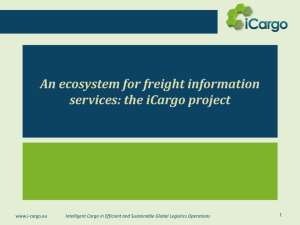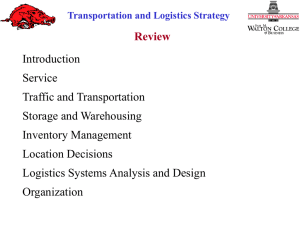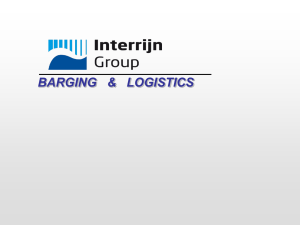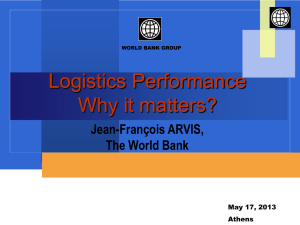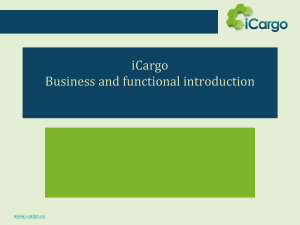iCargo_WP1 - Intelligent Cargo in Efficient and Sustainable
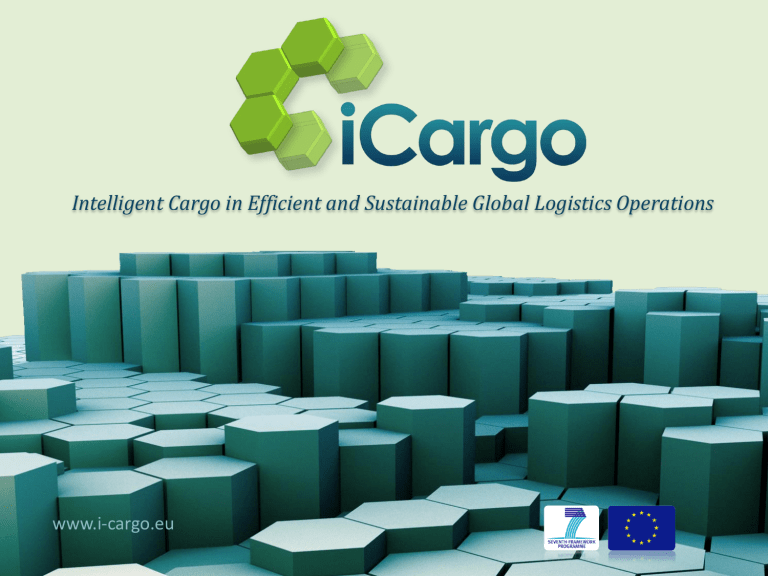
Intelligent Cargo in Efficient and Sustainable Global Logistics Operations www.i-cargo.eu
WP 1 - Common Framework Alignment and
Specification iCargo Project Review, December 5
th
, 2012
www.i-cargo.eu
Intelligent Cargo in Efficient and Sustainable Global Logistics Operations
2
WP 1 Objective
• Provide common foundations (including semantics) for cooperative planning, execution and completion of co-modal, low-carbon freight transport, taking into account: i.
The viewpoint and requirements of the different private and public involved stakeholders; ii. On-going industry and standardization activities; iii. Relevant physical and logical entities that need to be included in the iCargo common framework.
3 www.i-cargo.eu
Intelligent Cargo in Efficient and Sustainable Global Logistics Operations
5 business level innovations
Business level innovations
Overall goal: support new logistics services to:
• Synchronize vehicle movements and logistics operations across various modes and actors to lower CO2 emissions,
• Adapt to changing conditions through dynamic planning methods involving intelligent cargo, vehicle and infrastructure systems and
• Combine services, resources and information from different stakeholders, taking part in an open freight management ecosystem.
(from the DoW)
1. Collaborative planning
2. Logistic chain composition based on services
3. Re-planning of logistic chains by the client
4. Optimization of the use of resources in the logistic chain by logistic service providers
5. Monitoring the environmental footprint www.i-cargo.eu
Intelligent Cargo in Efficient and Sustainable Global Logistics Operations
4
1. Collaborative planning
Business level innovations • Objective
– Pooling and sharing resources
• Outlook
– Cooperating partners in a specific business community publishes availability of services and demand.
– Based on this visibility, organizations can decide to cooperate, e.g. combining shipments
• Effect
– Lower cost and emissions
5 www.i-cargo.eu
Intelligent Cargo in Efficient and Sustainable Global Logistics Operations
2. Logistic chain composition
• Objective
– «Amadeus for Freight» without a central database holding all services
• Outlook
– A distributed eCatalogue of logistics services that may be searched and services composed into appropriate chains automatically
• Effect
– Automatically providing the possible logistic chains for a certain shipment, composed of the available transport services.
www.i-cargo.eu
Intelligent Cargo in Efficient and Sustainable Global Logistics Operations
7
3. Re-planning of logistic chains
• Objective
– Provide ways to re-plan and change the logistic chain as goals change.
• Outlook
– Reusing all available capabilities for planning “on the fly”
• Effect
– Ensuring the best possible execution at all times www.i-cargo.eu
Intelligent Cargo in Efficient and Sustainable Global Logistics Operations
9
4. Optimising the use of resources
• Objective
– Provide the best possible resource utilisation.
• Outlook
– Logistic service providers are able to really be
“situational aware”.
• Effect
– Reduced cost
– Reduced emissions www.i-cargo.eu
Intelligent Cargo in Efficient and Sustainable Global Logistics Operations
11
5. Monitoring environmental performance
• Objective
– Measure environmental performance from both shippers’ and logistics service providers’ point of view. (iCargo concentrates on CO
2
)
• Outlook
– The environmental performance of all door-todoor transport operations is measured and reported
• Effect
– Environmental visibility in transport www.i-cargo.eu
Intelligent Cargo in Efficient and Sustainable Global Logistics Operations
13
act Reference Model
Common Framework
Logistics Demand
Logistics Demand Management
Transportation Netw ork Management
Infrastructure Management
Utilisation Management
Emergency Management
TPS
TSD TEP GII TS MWB
Logistics Supply
Logistics Serv ices Management
Logistics Operations Management
Vehicle Control and
Support
Logistics Unit Control and Support
CRS
Regulation Enforcement
Monitoring and Assessment
Physical Inspection
Interv ention and Sanctions
• Built on the UN/CEFACT core components www.i-cargo.eu
• Promoted for international standardisation
Intelligent Cargo in Efficient and Sustainable Global Logistics Operations
17




